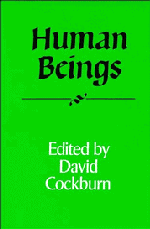Book contents
- Frontmatter
- Contents
- Introduction
- Machines as Persons?
- The Importance of Being Human
- Response to McNaughton
- Response to Diamond
- Real Selves: Persons as a Substantial Kind
- Personal Identity and Brain Transplants
- Personal Identity and the Idea of a Human Being
- Imagination and the Sense of Identity
- Radical Critique, Scepticism and Commonsense
- Getting the Subject back into the World: Heidegger's Version
- Incarnational Anthropology
- How Many Selves Make Me?
- Sartre and Our Identity as Individuals
- Bibliography
- Notes on Contributors
- Index
How Many Selves Make Me?
Published online by Cambridge University Press: 05 February 2015
- Frontmatter
- Contents
- Introduction
- Machines as Persons?
- The Importance of Being Human
- Response to McNaughton
- Response to Diamond
- Real Selves: Persons as a Substantial Kind
- Personal Identity and Brain Transplants
- Personal Identity and the Idea of a Human Being
- Imagination and the Sense of Identity
- Radical Critique, Scepticism and Commonsense
- Getting the Subject back into the World: Heidegger's Version
- Incarnational Anthropology
- How Many Selves Make Me?
- Sartre and Our Identity as Individuals
- Bibliography
- Notes on Contributors
- Index
Summary
Back Before Descartes
Cartesian accounts of the mental make it axiomatic that consciousness is transparent: what I feel, I know I feel, however many errors I may make about its cause. ‘I’ names a simple, unextended, irreducible substance, created ex nihilo or eternally existent, and only associated with the complete, extended, dissoluble substance or pretend-substance that is ‘my’ body by divine fiat. Good moderns take it for granted that ‘we’ now realize how shifting, foggy and deconstructible are the boundaries of the self; ‘we’ know that our own motives, feelings and intentions constantly escape us; ‘I’ names only the current speaker, or the momentarily dominant self among many fluid identities.
Kathy Wilkes has observed that the ancient Greek picture of human life, though nothing like as dissociated as some over-eager commentators have pretended, is hardly Cartesian. The Aristotelian synthesis proclaims ‘us’ as social animals, with distinctive, inter-related faculties that do not rely on one-same ‘Cartesian Consciousness’ for their existence and activity. This more fluid, extended, organically grounded conception of human (and other) being is truer to our experience, and to the discoveries of modern psychobiology, than any semi-Cartesian vision can be. Wilkes professes herself quite unable to grasp what it is that philosophers like Nagel think is left out of neo-Aristotelian science. I in my turn find it very difficult, or impossible, to take reductive or eliminative materialism seriously as an account(?) of my experience(?) or of the world that houses it.
- Type
- Chapter
- Information
- Human Beings , pp. 213 - 244Publisher: Cambridge University PressPrint publication year: 1991

